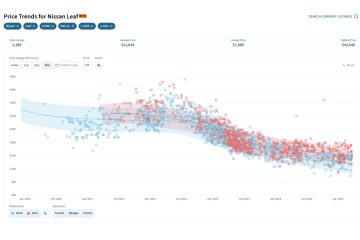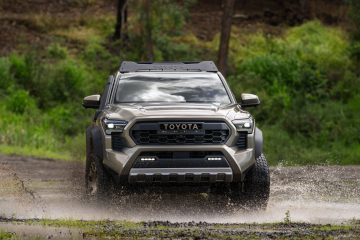I recently did an interview for a college newspaper. They didn’t end up using most of it, so I figured I’d post the answers here in case they’re of use to any college students out there! Here’s the unedited interview:
What are the most common mistakes when purchasing a used car?
I would say the two most common mistakes are spending too much, and buying without proper research. The first of these seems pretty obvious. Clearly everyone would rather spend less rather than more. But often people will spend more than they need to for reasons that don’t make a lot of sense. As one example, people are often afraid of a used car breaking, and so want to buy one that still has a warranty. The problem with that is, cars tend to lose 10-20% of their value each year. Therefore you can spend a lot less to get a car that’s 3-5 years old (or more), even though it’s out of warranty, than you would for a newer car. Not only do you spend less up front, but since the value when you buy it is lower, the depreciation you face each year is also lower, so you lose less when it comes time to sell.
Of course newer and more expensive cars tend to be nicer, so if someone has the money and realizes the depreciation that’s likely to occur, that’s fine. But buying a car several years newer just for the warranty doesn’t make financial sense. In most cases even if a bunch of things do go wrong and end up costing money, you’ll still end up ahead by buying an older car and saving more up front.
And that’s where research comes in. Too many people just walk into a local dealership, see a car they like (or that the dealer suggests they should like) and then buy it the same day. That’s a great way to spend too much on a car you won’t love. Instead, take your time. Start off by making a list of cars you might like to try. Then find examples for sale near you, and arrange test drives*. Be up front with the dealers that you’re not going to be buying today; you’re trying to narrow down your options. (Get their cards though, so that if you do end up wanting to buy that car, they can get the commission.) Once you decide what you like, find as many listings for them as you can and see what they tend to be listed for. Do some research into what common issues that model tends to face, so you know what to ask about or look for. Basically you don’t want to get into negotiating with a seller until you know exactly what you want, what it’s worth to you, and what to look out for.
*Pandemic permitting, that is. Honestly right now if you’re not able to do test drives due to the conditions where you live, I would hold off buying if at all possible. A car is really something you need to experience before buying.
What questions should a person ask before he/she buys a used car?
That depends a lot on the car. Many cars will have common issues that they tend to experience. For most models, there’s an enthusiast forum online somewhere where you can find that kind of information. Once you know what’s likely to come up, you can ask whether it has already been addressed on the car you’re looking at.
Aside from that, the main thing to ask is whether you can take the car to an independent garage for a pre-purchase inspection. For cars costing more than a few thousand dollars, this should be non-negotiable. Any reputable seller should be OK with allowing this. Many dealers will claim it isn’t necessary, as their own shops have already done a ‘full inspection’. But while most dealers are entirely trustworthy, some aren’t. And others may be honest but just not thorough. Better to find a good local mechanic (forums can be good for this too), and take the car there. You will spend a bit of money for the inspection, but it’s a lot cheaper than discovering an expensive issue after buying.
There are other details that are good to check, like making sure the seller has the title, that there are no liens on the vehicle, and that the VIN on the title matches that on the car. It’s also a good idea to get the Carfax and make sure there were no significant undisclosed incidents in the car’s history.
What are the steps to do to locate good used cars?
Alright, so the first thing to do is to narrow down the universe of cars to what you might want to buy. This will of course depend on your budget, your needs (cargo space, # of seats, climate), and your preferences (comfort, sportiness, size, etc.) If you have no idea, see if you can drive some friends’ cars, or find another way to try out some different types of vehicles. You want to at least know the basic class of vehicle you’re looking for, be it a coupe, a crossover, an SUV, etc.
Once you have a general idea of the price range and bodystyle you’re looking for, you can look up listings online to build a shortlist of specific models. Read reviews of those to try to narrow it down to just a few you’re interested in trying. Then drive those! As I mentioned earlier, you really have to drive a car to know whether you’re going to like it. Try to find some to test-drive at local dealerships, and be honest with the dealers that you won’t be buying today (and don’t!) You’re just trying to narrow down your choices.
So, hopefully a few test drives have narrowed it down to a specific model. The car you want, that suits your needs and is in your budget. Now the goal is to find the best one you can, and get the best deal on it. And the way to do that is to cast as wide a net as possible. You can use AutoTempest.com to search all the major car listings sites at once, making it relatively easy to find every one for sale near you. And by near, I mean up to at least a couple hundred miles. You might find a nicer or cheaper example, and all it will cost you is a few hours of driving.
So, once you find some candidates, you can contact the sellers, and start the negotiation process. I’ve written a whole article on negotiating for used cars, so if you’re interested you can check it out here. Briefly though, try not to commit yourself (even in your mind) to any particular car. The way to get a good deal is to not want any one car too much; to always be willing to walk away if the car or the price isn’t right. Ask about the condition of the car—anything the seller is aware of that it needs. Ask about the common issues that you researched for the model. And ask if they’re flexible on price. (Just about everyone is flexible on price, but how they answer the question can give you hints as to how flexible they are.)
If you don’t hear anything that rules it out, you can decide what is a good price for the car based on all the listings you’ve seen, what you know it needs, and also resources like the KBB or Edmunds value estimates. If you can get the seller to that amount, then it’s time to move on to the independent inspection. A thorough inspection will always turn up some minor things. If it turns up major things you may need to go back to looking at other options. But minor issues can be fine—use them as levers for negotiating a bit more off the price.
What should this person be looking out for?
So, it’s important to be aware that there are scams out there. Normally these take the form of cars listed for sale online, where they ask for a deposit, or even the full purchase price, to be paid online before the car is delivered. They will claim to have a money-back guarantee, so there’s no risk, and the listed prices will usually be too good to be true.
The easiest way to protect yourself against these kinds of scams is to do the transaction in person. You pay the money, you drive off with the car and the title. The exception would be if you’re dealing with a known, reputable company that uses a delivery model and has a money-back guarantee. Carvana is the most prominent example. Just remember that you need to know the company you’re dealing with; you can’t trust a random website’s claim to reputability.
How should this person check reliability – whether the car will break down?
Again the most important thing is to get an independent inspection. Ideally you would want to find a shop that specializes in the brand you’re buying. But the important thing is to take it to a shop of your choosing, not to go based on the seller’s internal inspection, or a shop that they chose.
Before you go to the expense of an inspection, there are some things you can check yourself too. You can start by checking for rust—look under the lips of the wheel wells and under the door sills; also check the paint for bubbling (another sign of rust), as well as chips, scratches, and other issues. Check that the tires have a good amount of tread and that it’s even. If you can see the brakes through the wheels (or the seller will remove a wheel for you) you can also check condition and wear of brake pads and rotors. You can test all the different electronic options to make sure they all work as expected—everything turns on and off, opens and closes, blows hot or cold, as expected. Pull out the oil dipstick and check that the oil is no darker than light brown. On a test drive be aware of unusual sounds, smells, or shakes.
That’s a short list, but you can google ‘what to check on a used car’ to find plenty more. Also as I mentioned before, see what issues commonly occur with the specific model you’re looking at, and check those too, or ask your mechanic to do so.
And ultimately, be aware that all cars require maintenance, and will sometimes need repairs. No inspection can tell you everything that might break tomorrow. You’ll want to have some budget set aside for these eventualities.
What kind of cars fit college students?
Honestly my advice to most college students would just be to spend as little as you can. Unless you’ve got rich, generous parents, it just makes sense to save your money at this point. When you stretch to buy a car, or even worse, finance a car you can’t afford to buy outright, you’re putting yourself on a treadmill where instead of saving for the future, you’re just working to pay off your past purchase. By the time it’s paid off, it feels old, and you can’t even sell it for near what you’ve put in. Plus, you’re constantly worried about what happens if it breaks, or gets damaged. It’s stressful and unsatisfying. Instead, you can buy something cheap for now, and wait until you’ve got some real money saved, the start of a retirement portfolio, and a solid income. Then you can afford to spend more on a car.
I remember when I was in grad school I really wanted a BMW 3-Series. I couldn’t afford the M3, but I did have enough saved up for something like a 335i (used, or course). But someone gave me this same advice, and instead I bought a $2000 Ford Contour. It wasn’t particularly fun, but it served me well for a few years, cost me almost nothing to run, and I ultimately sold it for almost what I bought it for. At that point I was thousands of dollars better off than if I’d bought the BMW, and probably ten thousand better than if I’d financed an M3. Not only that, when I really did have the extra money to spend on a cool car, I enjoyed it even more for the comparison.
So, if you need a car, buy something cheap that does the job. Start saving and investing for the future, and before long you’ll be able to afford a car you really love.
(Article continues below)




